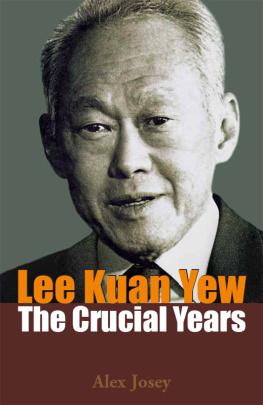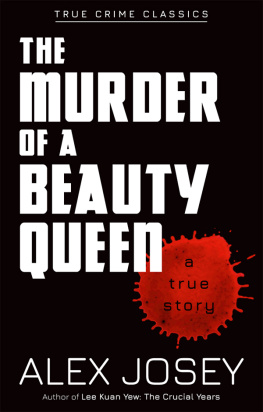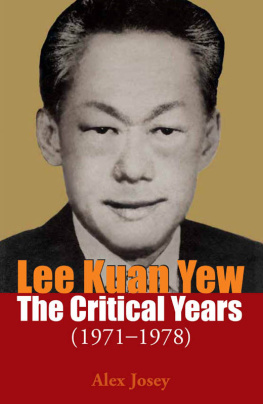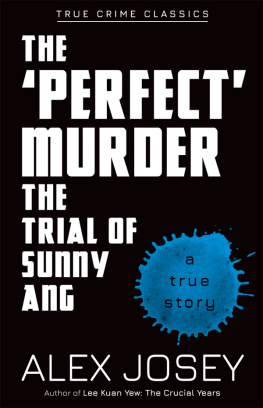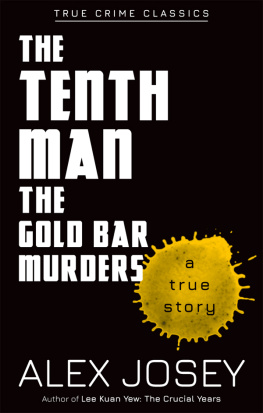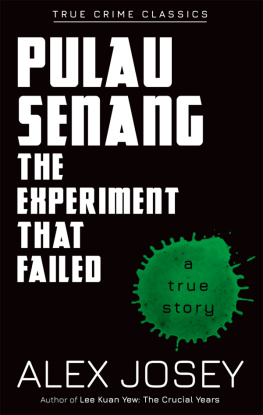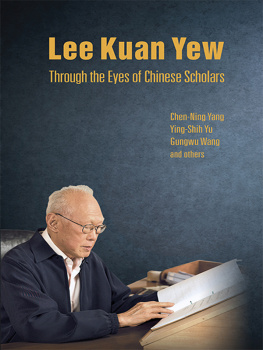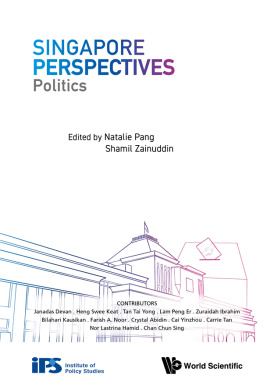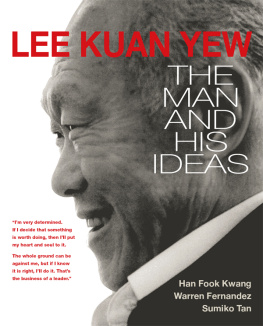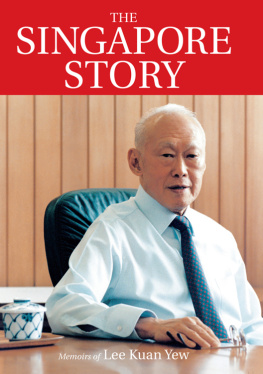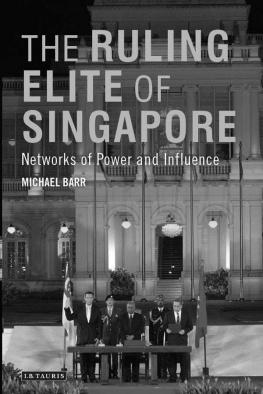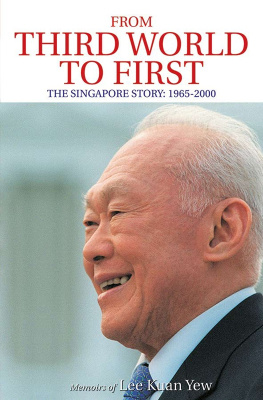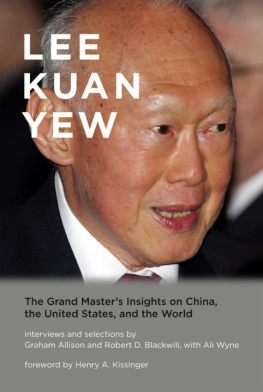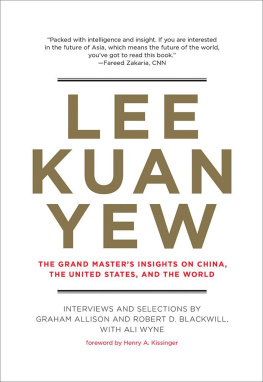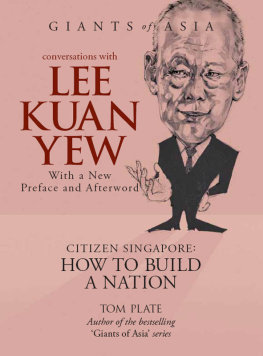Lee Kuan Yew
The Crucial Years
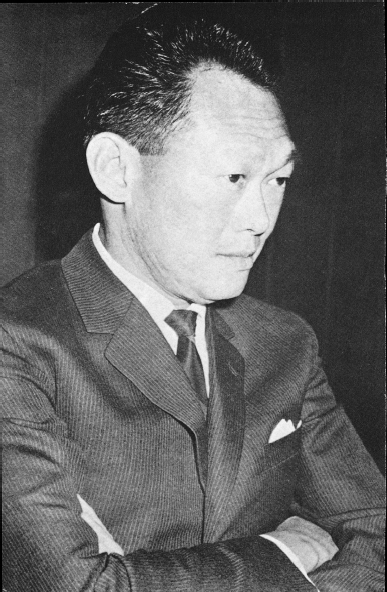
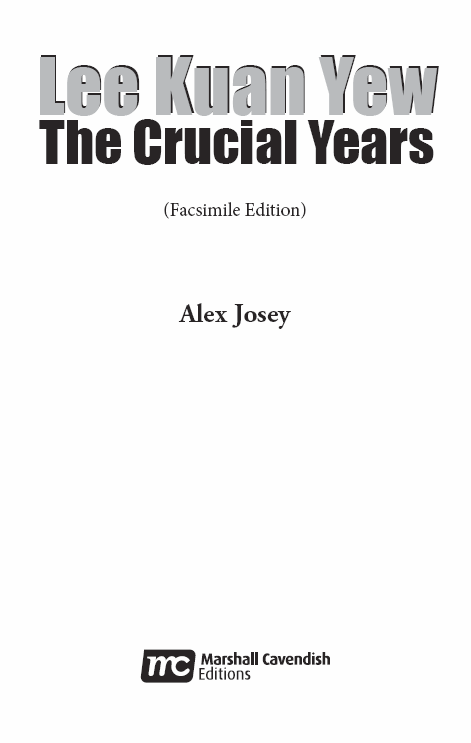
1968 Alex Josey
Cased edition first published in 1980 by Times Books International, reprinted 1984, 1986, 1987, 1989, 1993 (five times), 1994 (three times), 1996, 1997
This paperback edition published in 2012, reprinted 2013 by
Marshall Cavendish Editions
An imprint of Marshall Cavendish International
1 New Industrial Road, Singapore 536196
All rights reserved
No part of this publication may be reproduced, stored in a retrieval system or transmitted, in any form or by any means, electronic, mechanical, photocopying, recording or otherwise, without the prior permission of the copyright owner. Request for permission should be addressed to the Publisher, Marshall Cavendish International (Asia) Private Limited, 1 New Industrial Road, Singapore 536196. Tel: (65) 6213 9300, fax: (65) 6285 4871. E-mail:
The publisher makes no representation or warranties with respect to the contents of this book, and specifically disclaims any implied warranties or merchantability or fitness for any particular purpose, and shall in no events be liable for any loss of profit or any other commercial damage, including but not limited to special, incidental, consequential, or other damages.
Other Marshall Cavendish Offices
Marshall Cavendish Corporation. 99 White Plains Road, Tarrytown NY 10591-9001, USA Marshall Cavendish International (Thailand) Co Ltd. 253 Asoke, 12th Flr, Sukhumvit 21 Road, Klongtoey Nua, Wattana, Bangkok 10110, Thailand Marshall Cavendish (Malaysia) Sdn Bhd, Times Subang, Lot 46, Subang Hi-Tech Industrial Park, Batu Tiga, 40000 Shah Alam, Selangor Darul Ehsan, Malaysia
Marshall Cavendish is a trademark of Times Publishing Limited
National Library Board, Singapore Cataloguing-in-Publication Data
Josey, Alex.
Lee Kuan Yew : the crucial years / Alex Josey. Singapore : Marshall Cavendish,
2012.
p. cm.
Includes index.
eISBN : 978 981 4435 49 9
1. Lee, Kuan Yew, 1923- 2. Prime ministers Singapore - Biography. 3. Singapore Politics and government 1945-1963. I. Title.
DS610.73.L45
959.5705092 dc23 OCN797908607
Printed in Singapore by Markono Print Media Pte Ltd
For
Rosa Lilian Jane Josey
Political problems do not primarily concern truth or falsehood: they relate to good or evil. What in the result is likely to produce evil is politically false; that which is productive of good, politically true.
Burke
We, the developing nations, are determined to bring happiness and prosperity to our people and to discard the age-old shackles that have tied us not only politically but economicallythe shackles of colonialism and other shackles of our own making.
Nehru at the Bandung Conference, 1955
Lee Kuan Yew is one of the most outstanding dynamic minds in world statesmanship today...
Fenner Brockway, M.P. in the House of Commons, 1963
Mr Lee Kuan Yew is too clever by half...
Tunku Abdul Rahman Prime Minister of Malaysia, 1966
Introduction
In the Introduction to the first edition I said that this was a book about Lee Kuan Yew, Prime Minister of Singapore, told in part by Lee himself. Most of the book consists of direct quotations from speeches he made since 1950.
The second edition contains most of the earlier speeches, as well as the major speeches Lee gave in 1968, 1969 and 1970, and his speeches at the 1971 Commonwealth Prime Ministers Conference held in Singapore. There are also many more pages of illustrations in this edition.
More than a political biography, this is a book of value to politicians in other developing states. Most of their problems are the kind of problems that Lee Kuan Yew has had to contend with. His thinking on these matters has made Singapore unique as a rapidly progressing developing nation.
Alex Josey
Singapore, 1971
Contents
Part One
CHAPTER ONE
Early Days
I
LEE Kuan Yew was born at 92, Kampong Java Road, Singapore, on 16 September, 1923. His family have lived in Singapore for more than a hundred years and come from the Hakkas, a northern Chinese tribe of tough wanderers.
Lee Kuan Yew is an intellectual. He looks like an intellectual. He speaks like a scholar. His command of English is unusual. He is a quick thinker. At Cambridge he took a double first in Law, and in the final examination was placed first in the honours list, winning a star for special distinction. A British diplomat once described Lee as the most brilliant man around, albeit just a bit of a thug, a judgment considered fair enough in a political arena where an ability to meet opponents on their terms is an essential part of the successful politicians make-up. We are playing for keeps, Lee Kuan Yew warned the militant communists. He defeated them in democratically held elections, and in a referendum. Today, most of Lees political enemies have either retired from politics or are in goal. In the 1968 elections fifty-one of the fifty-eight PAP candidates for an enlarged Parliament were returned unopposed. Early in 1970 five members of parliament retired. In the subsequent by-elections, in April, the newly formed United National Front contested two seats, the PAP all five. Three of the PAP candidates were returned unopposed: the other two were returned with substantial majorities.
Five feet ten and a half inches tall, Lee Kuan Yew weighs 160 pounds. He watches his weight carefully. He rarely eats rice or bread, seldom drinks beer. He walks with a slight swagger, his shoulders thrown forward a little as each foot comes down. This may seem to indicate Lee Kuan Yews confidence or natural aggressiveness. More likely it is due to the fact that he has rather tender feet.
In his personal habits, Lee is inclined to be finicky. His hands are always scrupulously clean, his nails neatly cut and filed. He is incapable of doing anything slovenly or carelessly, whether it is putting on a highly polished shoe, or reaching an important decision. There is no room on his large desk for anything other than the letter to be signed or the file to be read.
Like President Kennedy, whom Lee admired, Lee Kuan Yew seldom reads for distraction. Like Kennedy, he does not want to waste a single second. Every moment of his life he seeks to invest, not spend. Aloof in manner, he is slow to make friends. He is suspicious of the hail-fellow-well-met approach. Lees sense of humour, developing with age, is not always kind. He suffers fools not at all, but he rarely prejudges anyone. Upon first encounter all are met on terms of equality. An exchange of a few sentences, however, is often sufficient for Lees decion: either the person reacts intelligently or he does not, and this judgment will apply to prime minister and dock-worker, don or road-sweeper.
Lee is a combined Left-wing demagogue and emphatic realist. Some things are possible. Others are not. He believes deeply in democratic methods, and his philosophy is built around the sanctity of law and the free will of the people: but there are times when he is reluctantly forced to take strict, even non-democratic measures against a minority of thugs, secret-society gangsters and political opportuniststhose who have placed themselves outside the rulesin order that he shall preserve the greatest good for the community as a whole. Lee never forgets that Singapore is in Asia, where Western concepts of democracy have yet to be understood by the masses and accepted as a way of life.

